MercoPress. South Atlantic News Agency
Stories for July 2015
-
Tuesday, July 14th 2015 - 06:28 UTC
Hillary Clinton vows banks cannot be “too big to fail” since it's still “too big a problem”

US presidential candidate Hillary Clinton criticized Wall Street and her Republican rivals, promising to impose tougher regulations on banks and raise the wages of ordinary Americans if she wins the 2016 White House race. Under pressure from a campaign rival on the left, Clinton said she would appoint strict overseers to ensure that financial institutions never again indulge in the risky behavior that helped cause the 2008 banking crash.
-
Tuesday, July 14th 2015 - 06:07 UTC
Caricom considering ECLAC proposal to write-off its multilateral debt
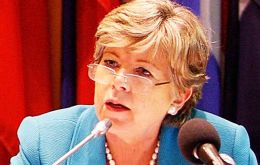
The Caribbean Community, Caricom is considering a proposal for the region to pursue gradual write-off of its multilateral debt as a means of economic prosperity. The debt relief strategy was put forward by Alicia Barcena from the Economic Commission of Latin America and the Caribbean (ECLAC), at the 36th Regular Meeting of the Heads of Government of the Caribbean Community, held in Barbados.
-
Tuesday, July 14th 2015 - 06:00 UTC
Brazil's economic team reaching out to credit rating agencies for a vote of confidence

Concerns that Brazil may lose its coveted investment grade credit rating are again on the rise among government officials and investors who worry that President Dilma Rousseff’s austerity push won’t fully offset plunging government revenues.
-
Tuesday, July 14th 2015 - 05:29 UTC
Barrage of accusations following a Judge's order to raid Maximo Kirchner's real estate agency
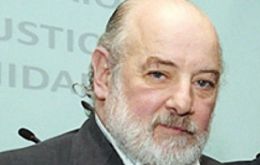
The raid ordered by an Argentine Federal Judge at a real estate agency which belongs to president Cristina Fernandez' son, Maximo Kirchner's in Rio Gallegos, triggered a barrage of accusations from government officials, just a few days ahead of decisive primaries in August, in anticipation of the October presidential elections.
-
Monday, July 13th 2015 - 09:30 UTC
Petrobras faces major class action lawsuit in US next February

Brazil's state-run oil producer Petrobras, said in a securities filing on Friday that its motion to dismiss a class-action lawsuit in the United States had been denied by the court. Petrobras said part of the complaint against the company relating to bonds issued in the United States in 2012 was denied.
-
Monday, July 13th 2015 - 09:21 UTC
Venezuela will stop buying Guyana rice amid escalating border dispute

Venezuela has decided to stop buying much of Guyana's rice crop amid an escalating border dispute between the two neighboring countries, the Guyanese finance minister said. The administration of president Nicolas Maduro has in the past four years purchased about 40% of Guyana's rice production, about 200,000 tons, paying for it with oil that amounts to about half of Guyana's daily supply needs.
-
Monday, July 13th 2015 - 09:03 UTC
The Peronist pope: Francis’s balancing act in Latin America, according to The Economist
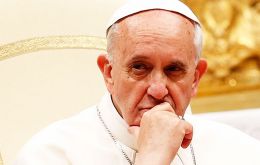
Under the heading of “The Peronist pope”, The Economist has a piece on “Francis's balancing act in Latin America” dedicated to the eight day tour of three of the continent's poorest countries, but with the largest percentages of Catholics. But for Francis it is also a delicate balancing act since several current leaders in the region tend to blend the Church's 'option for the poor' with Marxist ideology.
-
Monday, July 13th 2015 - 08:58 UTC
“A faith without solidarity, is a dead faith”, Francis tells a mass of over a million people
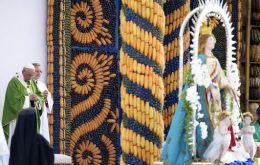
Pope Francis, wrapping up on Sunday his three-country tour of South America, urged people living in a flood-prone shantytown in Paraguay to stay united in their struggle for better living and working conditions.
-
Monday, July 13th 2015 - 06:36 UTC
Argentina' Cristina Fernandez flies to Paraguay meets Francis for the sixth time
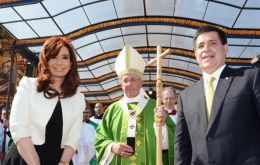
President Cristina Fernández was present on Sunday in the Paraguayan capital, Asunción to hear Pope Francis give mass during his visit, and greeted the Argentine citizens who had travelled to see the leader of the Catholic church. The head of state left the open mass at around midday, handing Francis a gift before retiring after witnessing the ceremony with Paraguayan counterpart Horacio Cartés.
-
Sunday, July 12th 2015 - 13:12 UTC
Falklands Group Reveals Details of the Life of “Veteran of the Malvinas” Alejandro Betts
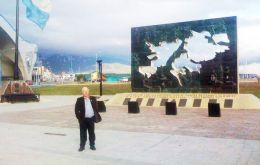
Alexander Jacob Betts was never exposed to any danger whatsoever from other Falkland Islanders or Britain’s Armed Forces during the 1982 conflict. This has been stated by the Falklands History Group in reference to Betts, who was born in Stanley, and lived in the Islands until the end of the 1982 conflict, but who is now an Argentine citizen.
